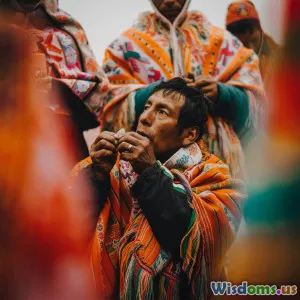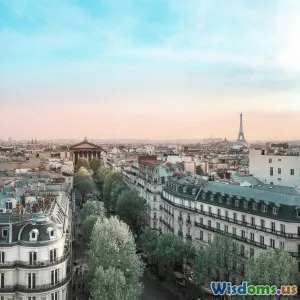
The Significance of Cultural Celebrations
7 min read Explore why cultural celebrations matter for identity, unity, and heritage preservation worldwide. (0 Reviews)
The Significance of Cultural Celebrations
Cultural celebrations are vibrant bursts of life, color, and legacy that echo from every corner of the globe. Far from simply marking special days on the calendar, these celebrations cement the ties that bind communities, reinforce identities, and embody centuries of shared experiences and values. But have you ever paused to wonder why societies, regardless of time or geography, devote so much effort and passion to their traditional festivities?
This article dives deeply into the multifaceted significance of cultural celebrations. From their role in preserving heritage to their power to build social cohesion, we will explore how these events offer much more than spectacle – they are indispensable pillars of culture and society.
Defining Cultural Celebrations
At their core, cultural celebrations comprise ceremonies, festivals, rituals, and events that are rooted in the customs, traditions, and histories of a particular group of people. These can be religious festivals like Diwali in India, commemorative days such as Juneteenth in the U.S., or harvest festivals like Thanksgiving.
These occasions often involve traditional music, dance, cuisine, attire, and storytelling — mediums through which culture is expressed, experienced, and passed down across generations.
Reinforcing Cultural Identity and Pride
One of the most compelling reasons cultural celebrations endure is their ability to strengthen a community's collective identity. They connect individuals to their ancestry, offering a tangible sense of belonging and continuity.
For example, the Japanese Cherry Blossom Festival (Hanami) celebrates not only the fleeting beauty of the blossoms but also national aesthetic values and social unity. Likewise, the Carnival in Brazil showcases Afro-Brazilian heritage and pride through mesmerizing parades, music, and costume.
As anthropologist Clifford Geertz explained, culture is “[...] the context in which meaning is constructed and understood by people,” and celebrations are critical arenas where this meaning is vividly enacted.
Case in Point: Indigenous Peoples
For Indigenous communities worldwide, cultural celebrations serve as vital acts of resistance against historical destruction and marginalization. The Powwows in North America, for example, are more than festive dances—they are assertions of identity, spiritual renewal, and cultural survival.
Fostering Social Cohesion and Community Bonds
Festivals act as bridges that link different generations, social strata, and even ethnic groups together. Shared participation in these activities nurtures mutual respect, empathy, and understanding.
Consider the Olympic Games, which, beyond athletic competition, celebrate peaceful international cooperation and cultural exchange. On a smaller scale, local harvest festivals in rural Europe have for centuries been occasions where neighbors unite regardless of socio-economic differences.
Studies indicate that communities with active cultural event participation display higher levels of social trust and cooperation. For instance, according to a survey by the British Festival Research, 79% of attendees reported feeling closer to their community after attending local cultural events.
Preserving and Transmitting Heritage
Cultural celebrations are living archives—they transmit intangible cultural heritage, from language and folklore to culinary traditions and craftsmanship. This transmission is crucial in a rapidly globalizing world prone to cultural homogenization.
The Chinese New Year celebrations, with their lion dances, firecrackers, and family gatherings, keep traditional narratives and social values alive for younger generations.
UNESCO’s Intangible Cultural Heritage lists numerous traditions tied to celebrations that bolster cultural diversity globally. Protecting these practices helps resist the erosion of identity and sustains creative expressions vital to human civilization.
Economic and Tourism Impacts
Beyond social and cultural benefits, celebrations often boost local economies. For example, Oktoberfest in Germany and Rio Carnival attract millions of tourists annually, generating significant revenue and employment opportunities.
Culturally rich celebrations encourage sustainable tourism that respects and promotes authentic local experiences, often incentivizing preservation efforts. Governments and organizations sometimes partner with communities to market festivals, balancing commercial interests with cultural integrity.
Challenges and Contemporary Adaptations
While cultural celebrations are precious, they are not without challenges. Issues such as cultural appropriation, commercialization, and exclusion of minority voices can undermine their value.
However, many communities are resilient and adapt by incorporating contemporary elements. For instance, virtual celebrations became prominent during the COVID-19 pandemic, keeping traditions alive despite social distancing.
The key lies in respecting authenticity, inclusivity, and community ownership to ensure that these celebrations remain meaningful and respectful.
Conclusion: Celebrations as Pillars of Culture
Cultural celebrations are far more than joyous gatherings; they are foundational to how societies define themselves, remember their past, and envision their future. They bolster identity, nurture communal bonds, preserve precious heritage, and even stimulate local economies.
In a world increasingly interconnected yet paradoxically prone to cultural loss, celebrating and supporting these traditions should be a global priority. Whether by participating, learning, or promoting respectful cultural exchange, each of us can honor and help sustain humanity’s rich tapestry.
As the Ghanaian proverb goes, “A people without culture is like a tree without roots.” Cultural celebrations are the fruit that nourishes those roots and keeps the tree thriving.
References:
- Geertz, Clifford. The Interpretation of Cultures. Basic Books, 1973.
- British Festival Research Group Survey (2021).
- UNESCO Intangible Cultural Heritage Lists: https://ich.unesco.org/en/lists
- Smithsonian Institution: Indigenous Powwow Culture
- World Travel & Tourism Council (Economic Impact Studies)
Embrace cultural celebrations — they are the heartbeat of citizenry, the canvas of identity, and the melody of shared humanity.
Rate the Post
User Reviews
Popular Posts




















